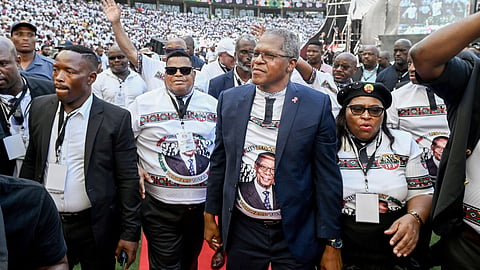IFP could consider an ANC alliance to avert a political standstill
In a pivotal move, South Africa's opposition Inkatha Freedom Party (IFP) contemplates aligning with the African National Congress (ANC) if elections fail to yield a decisive outcome. Amid concerns over potential gridlock, IFP leader Velenkosini Hlabisa remains open to forming a government of national unity, prioritizing stability. With the ANC's historic majority in jeopardy, this strategic manoeuvre underscores the evolving landscape of South African politics and the IFP's resurgence in influence, particularly in KwaZulu-Natal province.
Sign up for your early morning brew of the BizNews Insider to keep you up to speed with the content that matters. The newsletter will land in your inbox at 5:30am weekdays. Register here.
By S'thembile Cele
South Africa's opposition Inkatha Freedom Party said it would consider forming a government with the African National Congress should the ruling party fail to win an outright majority in elections next month.
The IFP won't undermine voters if they "compel" it to work with the ANC, party leader Velenkosini Hlabisa said on a conference call on Tuesday. The country's fourth-largest party is still committed to a pre-election opposition pact including the official opposition Democratic Alliance, but is aware that the group may not raise enough support to form a government, he said.
If the so-called Multi-Party Charter fails to win more than 50% of the vote, "we cannot allow the country to be at a standstill," Hlabisa said. "Should circumstances compel that we go the route of a government of national unity the IFP will not object."
Polls predict that the ANC could lose the outright majority it has enjoyed for 30 years and may have to rely on smaller opposition parties to form a government.
Hlabisa touted a government of national unity as an alternative to a coalition government with the ANC, saying the model allowed for "checks and balances" to be in place. A government of national unity governed the first 10 years of South Africa's transition from Apartheid to democracy from 1994 to 2004.
The DA has ruled out of a government of national unity, though it also signaled that it would abandon the Multi-Party Charter and consider a coalition with the ANC under certain conditions. The ANC has so far refused to entertain coalition talks but has suggested that a government of national unity may be a more stable form of governance.
The IFP has seen a resurgence of support the KwaZulu-Natal province. The ANC has conceded that it may lose control of the second-most populous province to the IFP.
Read also:
- Election campaigns 2024: MK, IFP, ANC just dipping into each other's support – AI & Big Data needed to pull unregistered voters…
- Hlabisa expects IFP to win KZN in '24; urges PA to join Opposition coalition
- Analysts say South Africa will be ruled by a coalition government after 2024: Who will lead with the ANC?
© 2024 Bloomberg L.P.

